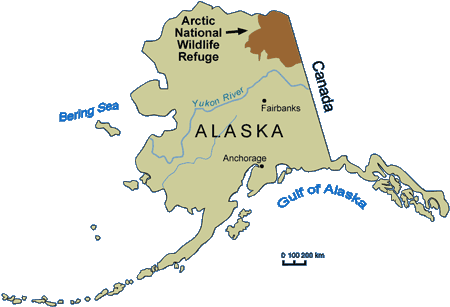Lizhik Gwats’an Gwandaii Goodlit translates to ‘The Sacred Place Where Life Begins’, which is what the Gwich’in people call the Coastal Plain of the 19.3 million acre land known as the Arctic National Wildlife Refuge (ANWR). The land was named this because it is the birthing, calving and post-calving grounds of the Porcupine Caribou herd – a herd that the Gwich’in have relied upon for food, cultural, and spiritual needs for thousands of years.
This sacred land is now under threat after the Trump administration issued a Record of Decision advancing an oil and gas leasing plan on ANWR – opening up this delicate ecosystem to oil and gas development.
This decision came at the frustration of the Gwich’in people who have been advocating and working tirelessly to protect ANWR and the habitat of the Porcupine Caribou and further fueled their determination to protect their sacred lands. Although the Department of the Interior says the plan includes protections for habitat and wildlife, these claims do not offer comfort to those who have relied upon this land for generations.

The Native Village of Venetie Tribal Government released a joint press release with the Arctic Village Council and the Venetie Village Council condemning the Trump administration’s decision.
“The Coastal Plain is one of the most important natural, cultural, and subsistence resources to the Neets’ąįį Gwich’in of Arctic Village and Venetie and to the Gwich’in people as a whole,” said Native Village of Venetie Tribal Government’s First Chief Margorie Gemmillin the release, “Any impacts to the Porcupine Caribou Herd from changes in migration patterns, lower fertility rates, and loss of habitat will have significant adverse social, cultural, spiritual, and subsistence impacts on our people.”
The Tanana Chiefs Conference (TCC) Full Board of Directors first passed a resolution in 1987 calling for the protection of the Porcupine Caribou herd. The resolution directs TCC to advocate for maximum protection for the Porcupine Caribou calving and habitat areas in ANWR in conjunction with any oil and gas development in ANWR. Similar resolutions were also passed in 1988, 1995, 1996, and 2017.
“TCC has always stood on the side of the Gwich’in people in protecting this sacred area and we oppose any development that could potentially impact that delicate ecosystem,” says TCC Chief/Chairman Victor Joseph, “The footprint that development will have on this sacred land will be much larger than what is indicated.”
TCC has shown support for the protection of ANWR on several occasions including during the Alaska Federation of Natives (AFN) Annual Convention, during several trips to Washington DC, and during meetings with important government representatives.
In 2016, AFN held its winter board retreat in Kotzebue, where they invited Alaska’s entire congressional delegation, as well as an array of lawmakers, leaders from municipal governments and Native corporations, and U.S. Interior Secretary Sally Jewell. Chief Joseph also attended this meeting where he advocated for the preservation of ANWR.
In 2019, Chief Joseph testified before the House Natural Resources Subcommittees alongside several Gwich’in tribal leaders; Gwich’in Steering Committee Director Bernadette Demientieff, Chief Galen
Gilbert of Arctic Village, Chief Dana Tizya-Tramm of Vuntut Gwich’in First Nation, and Sam Alexander of Fort Yukon, in Washington, DC on the protection of ANWR.
On August 18th, the day after the decision was announced to open up ANWR to oil and gas drilling, Chief Joseph met with Senator Lisa Murkowski to voice TCC’s opposition to the decision.
The first leasing sales of the land plan to be held before December 22nd, 2021 and the second by December 22nd, 2024.
Written by: Rachel Saylor, TCC Communications Manager
